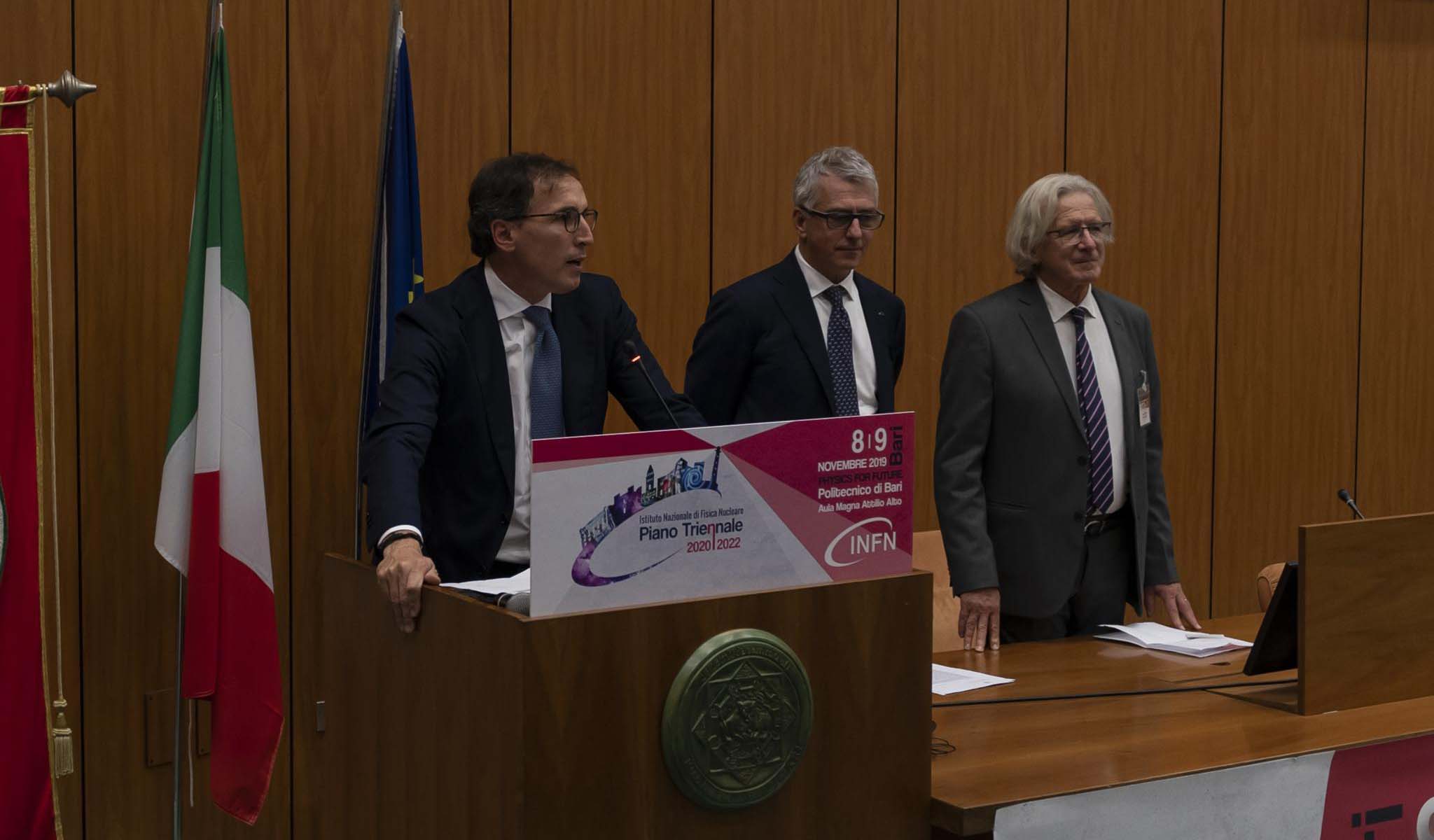 On 8 and 9 November in Bari, at the premises of the Polytechnic, the study days of INFN’s 2020-2022 Three-Year Plan were held, which this year featured the opening address by the Minister for Regional Affairs and Autonomies, Francesco Boccia.The Three-Year Plan is the event dedicated to the analysis, proposal and discussion of the scientific and other policies of the Institute in which the INFN community always participates in large numbers. In particular, this year's meeting, which was held just a few months after Antonio Zoccoli took over the Presidency of INFN from Fernando Ferroni, revolved around these three key words: vision, strategy and future. Minister Boccia's keynote was followed by greetings from the local authorities and institutions, at the end of which the proceedings began. The first day was dedicated to scientific topics, including the future European particle physics strategy, research on new physics and quantum technology. The second day focused on two of the main research infrastructures of INFN, the Southern National Laboratories and the Frascati National Laboratories, and the issues of technology applications and transfer, addressed from different perspectives, concluding with a general discussion on the main issues that emerged during the two-day event. ▪ HIGH SCHOOL STUDENTS ALL OVER ITALY TOOK PART IN RADON DAY1200 students throughout Italy explored environmental radioactivity: this is what happened on 7 November, the anniversary of the birth of Maria Skłodowska Curie, in more than 50 Italian high schools, on Radon Day, a day organised by the project for the dissemination of scientific culture, RadioLab, which aims to raise the awareness of students and the general public on environmental radioactivity issues.In many cases, the activities by students have been part of School-Employment Alternation Programmes. Radon Day involved high school students from eight Italian cities – Cagliari, Cosenza, Ischia, Lecce, Milan, Padua, Ragusa and Siena – engaged in measuring radioactivity in the field and meetings with researchers. Moreover, for the first time, this year a non-Italian school, the Korça High School in Albania, participated in the RadioLab project
On 8 and 9 November in Bari, at the premises of the Polytechnic, the study days of INFN’s 2020-2022 Three-Year Plan were held, which this year featured the opening address by the Minister for Regional Affairs and Autonomies, Francesco Boccia.The Three-Year Plan is the event dedicated to the analysis, proposal and discussion of the scientific and other policies of the Institute in which the INFN community always participates in large numbers. In particular, this year's meeting, which was held just a few months after Antonio Zoccoli took over the Presidency of INFN from Fernando Ferroni, revolved around these three key words: vision, strategy and future. Minister Boccia's keynote was followed by greetings from the local authorities and institutions, at the end of which the proceedings began. The first day was dedicated to scientific topics, including the future European particle physics strategy, research on new physics and quantum technology. The second day focused on two of the main research infrastructures of INFN, the Southern National Laboratories and the Frascati National Laboratories, and the issues of technology applications and transfer, addressed from different perspectives, concluding with a general discussion on the main issues that emerged during the two-day event. ▪ HIGH SCHOOL STUDENTS ALL OVER ITALY TOOK PART IN RADON DAY1200 students throughout Italy explored environmental radioactivity: this is what happened on 7 November, the anniversary of the birth of Maria Skłodowska Curie, in more than 50 Italian high schools, on Radon Day, a day organised by the project for the dissemination of scientific culture, RadioLab, which aims to raise the awareness of students and the general public on environmental radioactivity issues.In many cases, the activities by students have been part of School-Employment Alternation Programmes. Radon Day involved high school students from eight Italian cities – Cagliari, Cosenza, Ischia, Lecce, Milan, Padua, Ragusa and Siena – engaged in measuring radioactivity in the field and meetings with researchers. Moreover, for the first time, this year a non-Italian school, the Korça High School in Albania, participated in the RadioLab project






